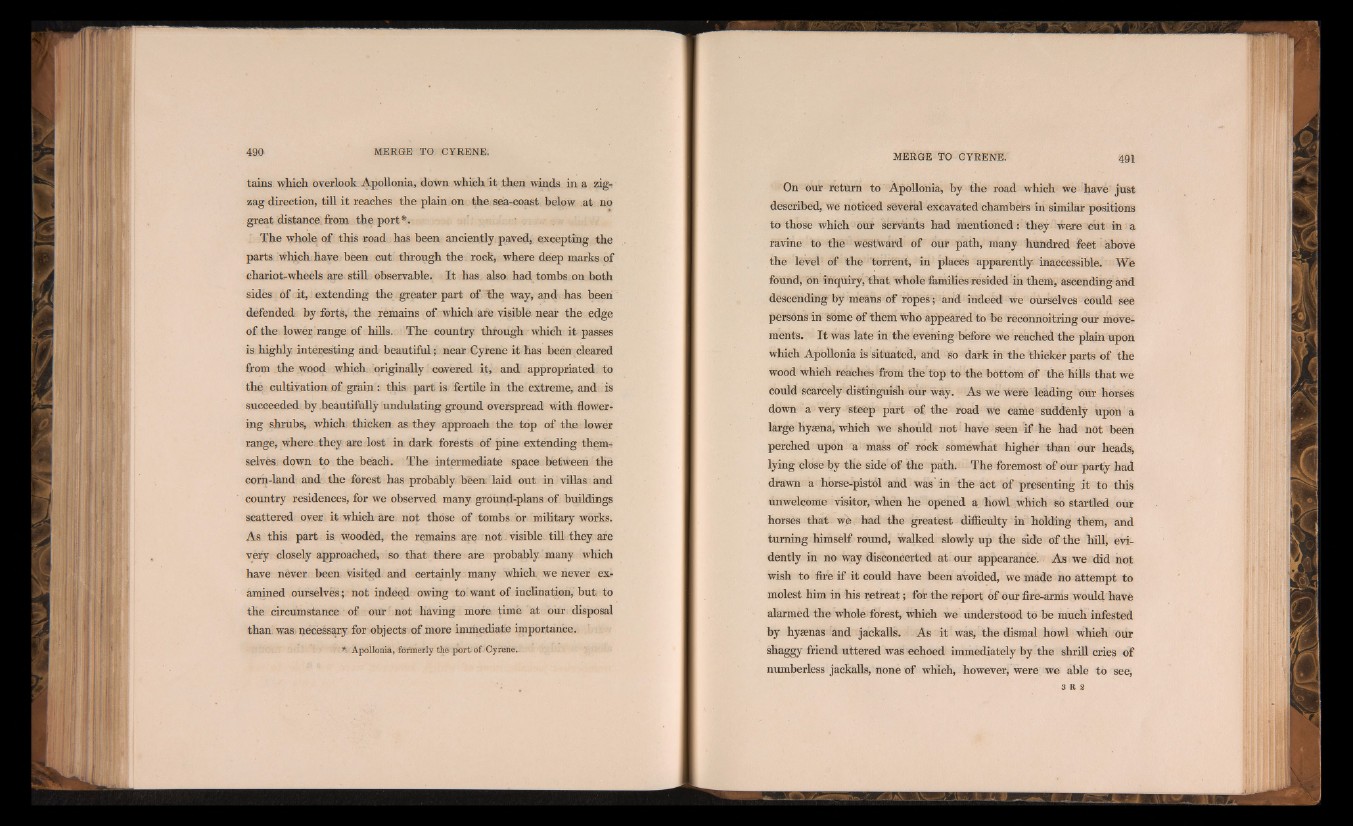
tains which overlook Apollonia, down which it then winds in a zigzag
direction, till it reaches the plain on the sea-coast below at no
great distance from the port*.
The whole of this road has been anciently paved, excepting the
parts which have been cut through the rock, where deep marks of
chariot-wheels are still observable. I t has, also had tombs on both
sides of it, extending the greater part of the way, and has been
defended by forts, the remains of which are visible near the edge
of the lower range of hills. The country through which it passes
is highly interesting and beautiful ; near Gyrene it has been cleared
from the wood which originally covered it, and appropriated to
the cultivation of grain : this part is fertile in the extreme, and is
succeeded by .beautifully undulating ground overspread with flowering
shrubs, which thicken as they approach the top of the lower
range, where they are lost in dark forests of pine extending them--
selves, down to the beach. The intermediate space between the
com-land and the forest has probably been laid out in villas and
country residences, for we observed many grohnd-plans of buildings
scattered over it which are not those of tombs or military works.
As this part is wooded, the remains are not . visible till, they are
very closely approached, so that there are probably many which
have nèver been visited and certainly many which, we never examined
ourselves ; not indeed owing to want of inclination, but to
the circumstance of our not having more time at our disposal
than was. necessary for objects of more immediate importance.
'* Apollonîà, formerly the p o r t of Cyrene.
On our return to Apollonia, by the road which we have just
described, we noticed several excavated chambers in s im i l a r positions
to those which our servants had mentioned: they Were -cut in a
ravine to thè wèstWard of our path, many hundred feet above
the level of the torrent, in places apparently inaccessible. We
found, on inquiry, that whole families resided in them, ascending and
descending by means of ropes ; and indeed we ourselves could see
persons in sbme of them who appeared to bè reconnoitring our movements.
I t was late in the evening before we reached the plain upon
which Apollonia is situated, arid so dark in the thicker parts of the
wood which reaches from the top to the bottom of the hills that we
could scarcely distinguish our way. As we were leading our horses
down a very steep part of the road we came suddenly upon a
large hy®na, which we should not have seen if he had not been
perched upon a mass of rock somewhat higher than our heads,
lying close by thè side of the path. The foremost of our party had
drawn a horse-pistol and was'in the act of presenting it to this
unwelcome visitor, when he opened a howl which so startled our
horses that we had the greatest difficulty in holding them, and
turning himself round, walked slowly up the side of the hill, evidently
in no way disconcerted at our appearance. As we did not
wish to fire if it could have been avoided, we made no attempt to
molest him in his retreat ; for the report of our fire-arms would havè
alarmed the whole forest, which we understood to be much infested
by hyaenas and jackalls. As it was, the dismal howl which our
shaggy friend uttered was echoed immediately by the shrill cries of
numberless jackalls, none of which, however, were we able to see,